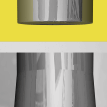
Cutting of sheet metal can be done with shearing, blanking or punching. In shearing the sheet is cut along a straight line between two cutting edges (like scissors). In blanking the desired part is cut from a larger piece of material. Punching means cutting materail away from the part, e.g. a hole.
The moovable upper cutting edge is called the punch, while the lower stationary is refered to as the die. The cutting is a combination of plastic deformation and fracture.
Danish Name
Category
Materials
Typical products
Car space frame
Paper puncher (the product function is punching)
Cover
Competing processes
Blanking
Shearing
Price notes
Varialble cost are low due to short processing times.
Environmen- tal notes
Additional info
Keywords
Plate
Holes
Square holes
Photo
Copyright
This page is part of Design inSite
Disclaimer